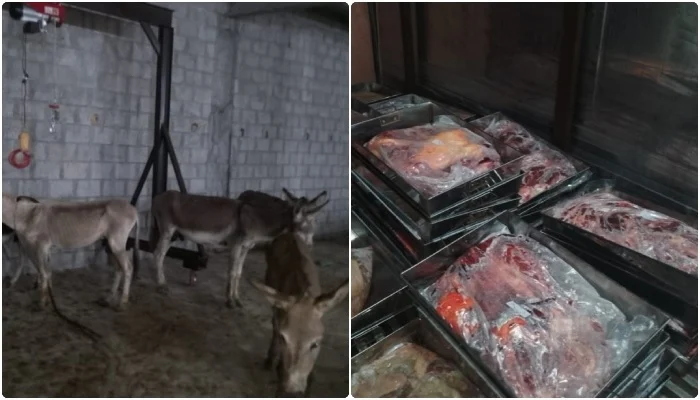Authorities in Islamabad uncovered a large illegal operation involving the sale of donkey meat. Acting on a tip-off, police and food safety officials raided a farmhouse in the Sangjani area, recovering over 1,000 kilograms of processed donkey meat and around 45 live donkeys.
A Chinese national was arrested at the site, while the Pakistani workers present fled before authorities arrived. Investigations revealed that donkeys were brought from various cities across Punjab and slaughtered at the farmhouse. The meat was allegedly being sold without any legal documentation, and the hides were processed and exported to China, reportedly for cosmetic and pharmaceutical use.
Officials have yet to determine exactly where the meat was being supplied. With no official records or permits found, the case has sparked health concerns and intense reactions online.
Foreign National Entered Pakistan on 90-Day Visa

The arrested man, identified as Zhong Wei, had entered Pakistan on a 90-day visa. During initial questioning, he stated that local Pakistani workers handled operations and that he was unaware of the exact destination of the meat. He also mentioned that the actual owner of the business resides in China.
According to police, several hundred donkey hides were also recovered from the location, believed to have been prepared for export through Gwadar. Officials say individuals from Punjab, Khyber Pakhtunkhwa, and Azad Kashmir were supplying donkeys to the operation.
Public Demands to Know Where the Meat Was Supplied
The discovery triggered strong reactions on social media, with many referencing past incidents in Lahore involving donkey meat. Several users joked that Islamabad had now joined the infamous list, while others demanded accountability and transparency.
One journalist asked, “Were all these donkeys slaughtered here? Where was this meat going? Which restaurants were using it?” Social media users called for an official list of implicated businesses and immediate closures of any involved establishments.
Public concern is growing over how long this operation was running and whether any contaminated or mislabeled meat entered the consumer market.
Exports from Pakistan and Donkey Hide Demand in China
This illegal bust comes at a time when Pakistan had already initiated a legal trade with China involving donkey meat and hides. A slaughterhouse in Gwadar—operated in partnership with a Chinese firm—had begun production earlier this year, officials from the Ministry of Food Security confirmed in a parliamentary committee meeting.
The Pakistan Bureau of Statistics reported that the country’s donkey population rose from 5.93 million to over 6.04 million this year. A 2017 commerce ministry report revealed that nearly 150,000 donkey hides had been exported in just four years, generating millions in revenue.
China has a high demand for donkey-derived gelatin known as “Ejiao,” which is used in traditional medicine and beauty products. The substance is believed to have anti-aging and health-enhancing properties and is produced by boiling donkey hides into powder or gel form.
However, this booming industry has also drawn criticism from animal rights organizations. A UK-based group reported that nearly 5.9 million donkeys are slaughtered globally each year for their skins—a number that continues to rise. Verifying exact figures from China’s supply chain remains difficult due to limited transparency.
As the investigation unfolds, Pakistani authorities are now under pressure to clarify the boundaries between legal exports and illegal operations, while ensuring public health and ethical standards are upheld.







